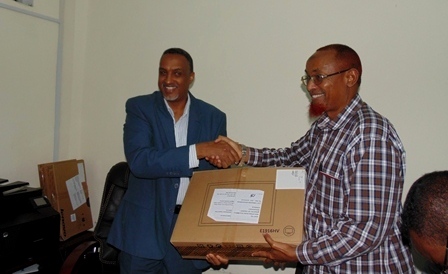Government to adopt integrated financial system to curb graft and enhance efficiency, Finance Minister says

Key government departments notably the ministry of Finance, the central bank and the Mogadishu airport and sea port will soon be interconnected through the Financial Management Information System, FMIS to promote efficiency and curb graft.
The move which is part of the government’s efforts towards standardizing practices and effective financial management in line with the country’s National Plan and IMF regulations will be rolled out following the distribution of computers and printers to 57 departments Sunday.
Speaking during the handing over of the equipment Sunday, Finance Minister Adan Ibrahim Fargeti noted the equipment will be instrumental in data capture and ease work flow in government.
“We distributed this equipment to 57 departments today. The equipment will be use to record data, ensure prudent fiscal management and enhance work flow. We will now be able to get real time information whether it is monthly reports or every three months,” said Fargeti.
The International Monetary Fund, IMF April said it had reached a Staff Monitoring Program agreement with the Federal Government of Somalia which is a significant milestone for Somalia, marking the move toward normalizing relations with International Financial Institutions.
The program will focus on policies to improve governance and fiscal management, strengthen institutions, foster financial sector development, and fill considerable data gaps. Technical assistance and capacity building will be an integral part of the program. The programme is slated for this month and expected to run for the next 12 months.
IMF said July last year Somalia was not yet eligible for credit from international financial institutions pending clearance of the country’s arrears of about $328 million. But IMF mission chief Rogerio Zandamela noted the Fund “could advise the authorities on appropriate macroeconomic policies, including in the context of a staff-monitored program, which is a kind of “shadow program” involving a dialogue with the IMF on economic policies but which offers no financing.”
Clearing the country’s arrears requires the authorities to develop a track record of performance, and that is usually done through such a program. This would pave the way for Somalia, in due course, to obtain debt relief, said Zandamela.